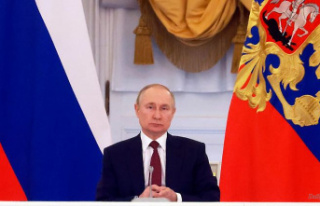According to the current legal situation, the rules for containing the pandemic end on April 7th. The statement by the virologist Drosten that the endemic is now knocking on the door prompts politicians in the traffic light coalition to discuss lifting government regulations. But the Chancellor brakes.
Chancellor Olaf Scholz indirectly spoke out against an immediate end to the remaining corona measures. "The Chancellor is of the opinion that we have reached a good agreement and that we have a legal situation that enables the federal states to adapt very flexibly to the changing situation," said deputy government spokeswoman Christiane Hoffmann in Berlin. Health Minister Karl Lauterbach made it clear that as things stand at present, no extension of the measures would be necessary beyond April 7th. "In this respect, that is the Chancellor's position."
The debate was triggered by an interview with the Berlin virologist Christian Drosten. He had told the "Tagesspiegel" that in his opinion the corona pandemic was going into an endemic situation. After that, Federal Minister of Justice Marco Buschmann, among others, called for the containment measures provided for in the Infection Protection Act to be abolished by ordinance by April 7th.
The topic also causes disagreement in the countries. The Prime Minister of Rhineland-Palatinate, Malu Dreyer, rejected calls for the mask requirement to be lifted. The remaining protective measures "I think make sense at the moment, even in view of the rampant respiratory infections," she told the newspapers of the Funke media group. Hamburg's First Mayor Peter Tschentscher made a similar statement. He referred to the high burden on the clinics. "That's why now is the wrong time to end the mask and isolation requirements," said Tschentscher of "Zeit".
Bavaria's Health Minister Klaus Holetschek, on the other hand, told the editorial network Germany: "It would be disproportionate to leave the current regulations unchanged until April 7, 2023, when they are scheduled to expire." The recommendation to voluntarily wear protective masks in public transport will also make sense in the future. "But it is time to move from a phase of obligations to a phase of recommendations and personal responsibility."
In addition to Buschmann, other FDP politicians called for an end to state regulations. "We no longer need state-mandated measures such as the mask requirement in long-distance transport and in hospitals," said health expert Andrew Ullmann of the "Welt". Federal Deputy Wolfgang Kubicki told the "Rheinische Post" that Lauterbach had to "recognize that there can no longer be any justification for restrictions on fundamental rights. I expect that the Infection Protection Act will be changed quickly."
The German Hospital Society (DKG) advocates maintaining the existing protective measures until the end of February. Until then, you should be patient, said CEO Gerald Gass to the broadcaster "Welt". "I can understand that the minister (Karl Lauterbach) warns against simply giving up everything overnight in this overall situation". There are good reasons to remain cautious. "That's why our appeal to the population to support the protective measures is definitely until the end of February, that's our forecast."
Like Lauterbach, Gaß referred to the current “very tense” situation in the hospitals, due to a relatively large number of patients with infectious diseases and at the same time high staff shortages. Masks also protected against other infections, he said. Influenza is currently the most preoccupying of the clinics, ahead of Corona and the RS virus in children and adolescents.
In the debate, Federal Health Minister Karl Lauterbach urged caution on Tuesday evening. "In my view, dropping all measures in a hurry would make little sense," he said in ZDF's "heute journal". "It is correct that we are now going into an endemic state," Lauterbach joined Drosten. However, Germany is currently "in a bad situation, the hospitals are completely full, the staff is overworked," he warned. In addition, 100 to 150 people would die every day with or from Corona. "So a very quick opening here doesn't really make sense."
If all measures were to end now, "then the burden would of course increase in a way that would not be justifiable," said Lauterbach. "We'll see if we stick to it until April," he said. But "after three years of the pandemic, a few weeks is not important if we are in a particularly difficult situation".
Lauterbach said in the interview that he did not want to publicly respond to a letter from Buschmann regarding the end of the measures. Spokesmen for the health and justice ministries announced in Berlin that talks would now be held within the government. They did not give a time frame for this.












